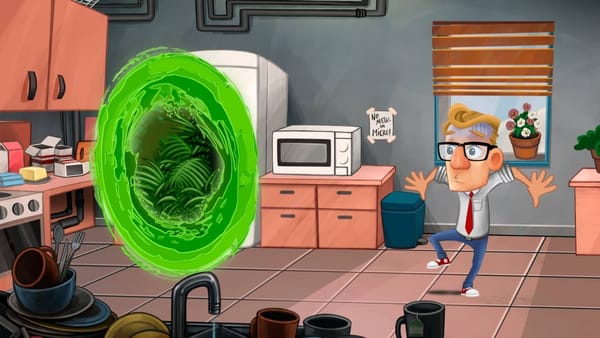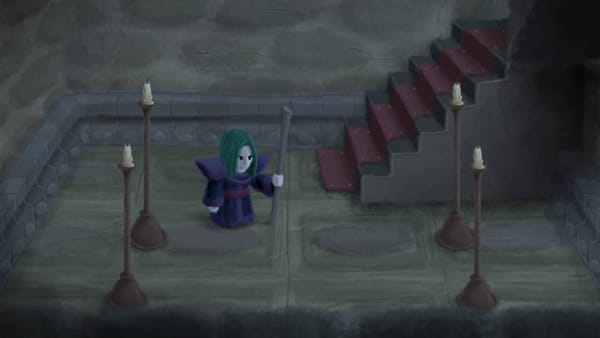10 Games That Prove 'What Kills Us Makes Us Stronger'

Never has a gamer wielded as much power as the Power Glove for the NES (God bless you, Fred Savage) than being responsible for the safety of their game character(s).
Like a twisted pied piper, we lead them to their demise through a lack of understanding on how to reach that elusive ledge, testing the distance between the floor and the bosses’ oversized axe, or for pure comical value as that big splat of flesh and bones is funny.
But more often than not, it’s because we sacrifice them due to our incompetence. Admit it. Sometimes they’ll suffer through our ignorance, other times in spite. In this list, we look at the games where offing the protagonist(s) isn’t the end, but a learning experience, and in some ways, makes us stronger. Pfft! That’s one way of interpreting it.
Dark Souls Trilogy/Bloodborne
Let’s tackle this one with one large stone and multiple birds: the Dark Souls series, Bloodborne and all other Souls-like makes us stronger through repetition. Permadeath in these games is as foreign as a game of Quidditch while vault hunting in Pandora.

Die, farm some areas, head back and try again. Or, if you’re a freak, kill each enemy with a spoon, taking zero damage whilst practically naked. You people make me sick. For everyone else, dying is a way to exploit the mechanics, come back with a plan of attack, or grind those lesser enemies with a bigger axe.
Sekiro got it wrong. Each time you died, the situation got worse and affected those around you. That’s just wrong. If we want realism, we’d all replace one of our arms with a prosthetic and swing from roof to roof in the shadows, taking out trolls like it’s nobodies business. Instead, From Software put the focus on ability rather than dying to get stronger. Foiled again.
Lemmings
No game has replicated the mass destruction that Lemmings first brought to our screens so many years ago. When rogue-like was more likely associated with the cosmetics industry, Psygnosis’ Lemmings was groundbreaking in that you could off your whole team without any repercussions.
Granted, this isn’t in line with the title of ‘what kills us makes us stronger’, but in some ways, it was true. Unsure on how to get our beloved rodents to their cliffs of doom, we’d experiment with the limited repertoire of digging professionals and ‘bashers’ and send them to their death. Perhaps that fall was bigger than we thought.
But sacrifices have to be made, and killing one of the lemmings to allow others to get past a block or ensuring that loyal stopper won’t forever be standing there with their arms held out in vain could be nuked instead. Best of all, the actual nuke button allowed for the rapid destruction of everything on the screen – oh no!
Inside
Without any health gauges, skill trees or upgrades (that’s debatable) to list, Inside’s death cycle is only beneficial for scoping out an area until you get it right.
Where are the enemies coming from? Does that claw fire from this spot or over theerrrrrrrrreeee! Dead again. Inside is a pretty gruesome game as you frequently see scenes of a poor boy reach a premature death. Again and again.

But there’s zero unlocks here, and fiendishly forcing a death isn’t as fun as it should be – this game can be pretty scary at times. Still, he refuses to die, and without anything to lose other than your bowels, this is one of those games where repeat deaths will make you stronger. That is, you know where the threats are coming from and can (hopefully) avoid them.
LittleBigPlanet
You won’t see this game on other lists as it’s not commonly associated as a rogue-like or a game that has people climbing the walls through its unfair challenges, though it did have a fair share of elusive collectables.
It was these ‘must-have’ costumes and stickers that meant our little Sackboy became a victim of the sacrificial altar more times than a sketchy death metal convention.
Sometimes you’d make a genuine mistake and land in an area that was impossible to jump out of; other times, it was that leap of faith to reach one of those sticker bubbles at the risk of getting trapped in an out of bounds area. What do we do to rectify this error? Forget a return to the last checkpoint menu option; you’re just about to kill off Sackboy so he’ll respawn. Shame on you.
Another World
This is an entry for the oldies out there that had the (mis)pleasure of playing the classic Another World in the 16-bit era. Before Flashback, which you may have played on a more recent system like the Switch in its remastered form, Delphine Software’s early cinematic adventure wowed gamers with its movie feel, but more importantly, ruthless mechanics.
One small leap has nothing to do with your fellow human – it could mean instant death. Without any health bars or understandable dialogue, Another World was one of the pioneers for exploration at the expense of its protagonist.
Found a gun? Great! Like martial arts or any contact sport, sometimes you have to learn to be hit to apply a hit. In this case, you’ll know what it’s like to be vaporised by being shot with the same laser gun. This was one of the early games to promote trial and error by learning your environments by using your best skill to hand: dying. A classic that still feels as difficult as all those years ago.
Death’s Gambit
Maybe this isn’t the title that instantly springs to mind, but this Souls-like adventure has a pretty high body count, considering all the hallmark mechanics of try, die, rinse and repeat.

However, the sadistic spotlight turns to one platforming section where your dead bodies serve as a climbable slope to some goodies. For each death, a corpse will pile up. Need to know how many times you have to die until you can reach that ledge? Just take a peek now and again, and if that skull aids your ascension, you’re there.
Alternatively, just be really bad at the game, and you’ll achieve this death hill in no time at all.
REZ PLZ
Have you heard of this one? If not, you should check out this 16-bit retro vibe for the comedy value, if not for the gratuitous death scenes. As per the blurb for the game, it’s a twist on co-op gameplay with a single-player experience.
You play two half-wit brothers training to be mages. After an unexpected disaster, only the siblings are left to save the day, but they’re not the brightest of heroes and put their own lives at risk throughout. Fortunately, they have a resurrection stone to reanimate their corpse, which is fundamental to gameplay.
Here’s the thing: you use your brother to get to a new area by solving a problem – often using their physical vessel as the solution. Need to reach an elevated position? Throw them onto some spikes and hop over them like a make-do carpet. There’s no need to feel bad as you can revive them anyway, and besides making you stronger by progressing further into the game, it also builds upon that brotherly bond. Awwwww.
Super Meat Boy
Is death only the beginning? If that’s the case, maybe we should quit while we’re ahead. However, those countless deaths mean that you haven’t quite perfected the level yet.
Operating on those same principles of trial and error, the hard way, the only way to get good at this game is by dying, unless you’re blessed with mad skills and can finish each level in one attempt and within the time limit, without watching a walkthrough.
That’s right, to get stronger, faster and better at Super Meat Boy, you need to die, and in this game, it’ll be a lot. Replays are usually reserved for goals in the onion net or a flash of wheels in a well-run Gran Turismo stage, but here it’s a reminder of how many attempts it took to save that pain in the arse Bandage Girl.

Resident Evil 4
There was a time when zombies were slow and would only target stationary plants. At one point, the Resident Evil series took its time with its undead antagonists, still with a fair amount of scares and all, but you had time to get your bearings and decide whether you should open that box of ammo or not.
Resident Evil 4 changed that by having a seemingly endless wave of zombies attacking. Man, they were relentless. Due to the change in gameplay, it naturally felt a bit more complicated, regardless of the level you set it at. But for some reason, it started to get easier the worse you were and the deaths you experienced. Were you evolving with the game?
This one’s a secret, so don’t tell anyone, but Resident Evil 4 had a dynamic difficulty system. If you continually missed the targets or repeatedly took damage, the game would get easier as the attackers would be less aggressive. Another win for those who take pride in death.
The Assassin’s Creed Series
Ok, admittedly, this is a bit of a cop-out, but it’s a relevant entry. Think about all those side missions on offer that could potentially improve your abilities, but running back and forth through hostile zones was too risky. If only there were a fast travel option…
Whenever I play an Assassin’s Creed game, the first objective is to find the fast travel points – even if it means dying in the process. In the most recent title, travelling to Winchester when so underpowered would seem fruitless, and yes, Eivor died a tragic yet swift death (only to respawn – thanks Animus).

In what way did this make us stronger? Completing these side quests and unlocking items of interest could now be obtained by fast travelling everywhere and even becoming a little overpowered against the seemingly impossible zealots. Not anymore. It’s a double-edged sword, too: your horsey doesn’t have to tread treacherous grounds anymore.
Don’t overthink this feature, it’s just one of those… what do you call it…? Brain farts. I hate that term more than you, but I’ve had too many hops to care right now. Thanks for reading x




